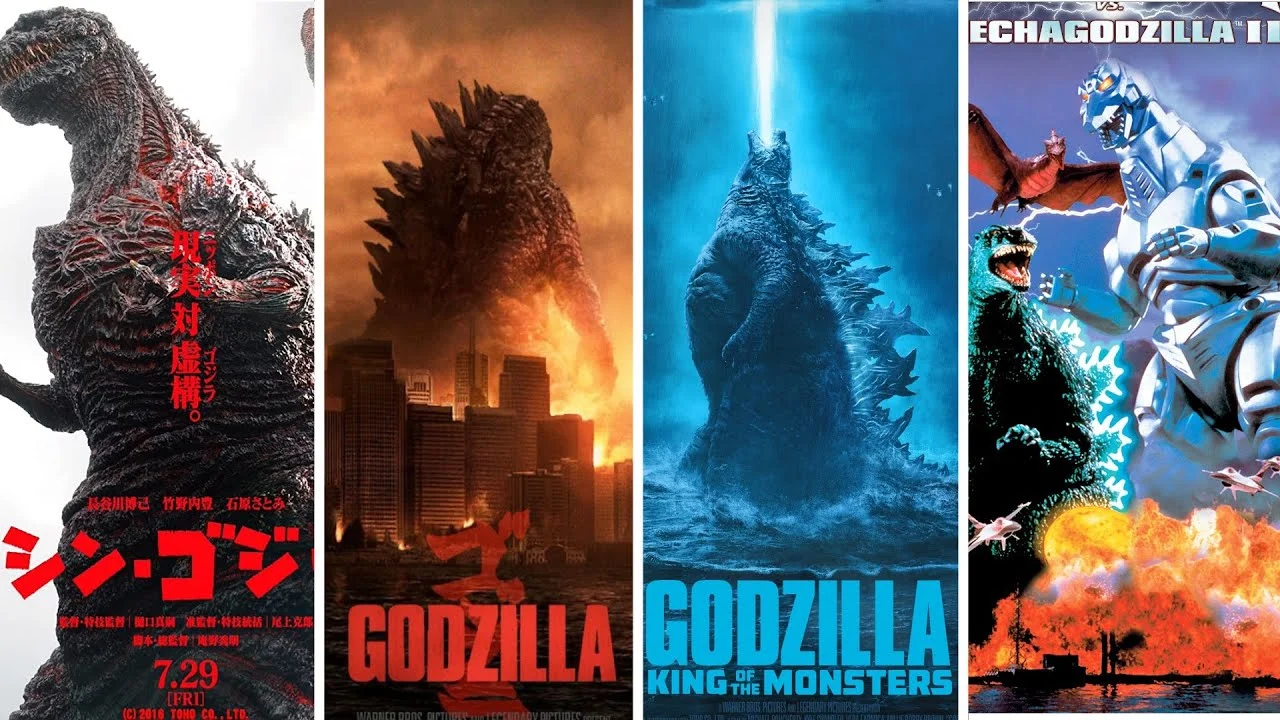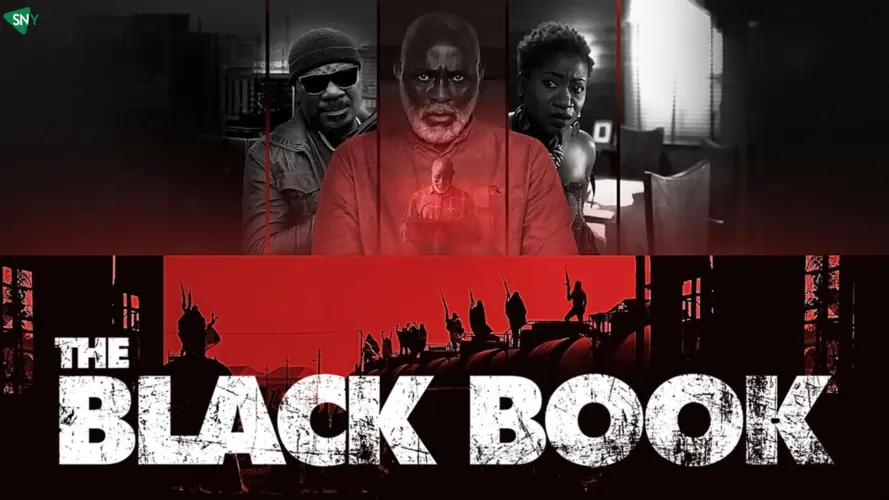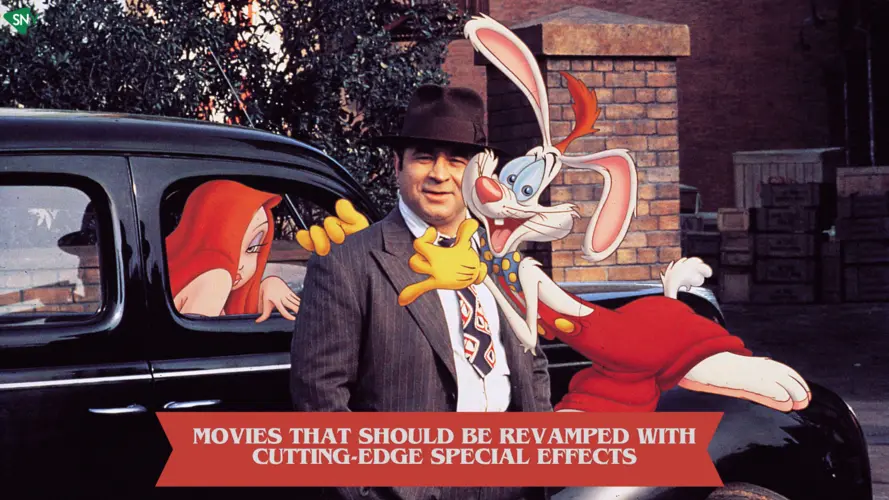Godzilla, often likened to the James Bond of colossal reptiles, has held its colossal reign for over seven decades. Emerging from the depths of the ocean, it brought with it a message of cataclysmic atomic devastation, much like that one friend who stumbles into the Super Bowl party with a crockpot brimming with “queso dip,” suspiciously concocted from tap water and an abundance of macaroni cheese powder packets.
Over the years, Godzilla, the King of the Monsters, has graced the silver screen in no less than 36 official films, a dozen more than the British superspy, James Bond. With the release of “Godzilla vs. Kong” in theaters and on HBO Max, it’s an opportune moment to offer you a comprehensive viewing guide to help you navigate the nearly seven decades of Godzilla’s reign.
The Godzilla franchise boasts its share of reboots, a multitude of distinctive kaiju (monsters), and recurring motifs that have peppered the cinematic landscape over the years. This complexity may lead you to believe that the series is more intricate than it truly is.
Surprisingly, there’s relatively little overarching continuity, as each new installment typically stands alone. However, it does often require a basic acquaintance with certain characters and events, even if that familiarity extends only as far as being able to point at the screen and exclaim, “That’s Godzilla!”
As a result, we’ve meticulously dissected how to approach every Godzilla movies in both chronological order of events and in the sequence of their release. This way, you can immerse yourself in the franchise in the manner that suits you best, whether you’re seeking to grasp the intricacies of the storyline or simply revel in the colossal battles on screen.
Upcoming Godzilla Movies
Attention, kaiju fans! The iconic monster saga continues with two electrifying Godzilla films slated for 2023! First, brace yourselves for “Godzilla x Kong: The New Empire” releasing on April 12th, promising another epic showdown that’s sure to shake the cinematic universe.
And as the year ends, delve deeper into the enigma of the king of monsters with “Godzilla Minus One” on December 1st. These films are set to redefine monster movie magic, offering audiences thrilling narratives and groundbreaking visual spectacles.
Mark your calendars; the titan is set to roar louder than ever!
- Godzilla x Kong: The New Empire = April 12, 2023
- Godzilla Minus One = December 1, 2023
Godzilla Movies In Order (Chronological)
Godzilla vs. Kong – 2021
- Director: Adam Wingard
- Cast: Alexander Skarsgård, Millie Bobby Brown, Rebecca Hall
Description: In a world where Titans roam, the two alphas, Godzilla and Kong, inevitably clash. As Monarch uncovers secrets about the Titans’ origins, the two behemoths engage in a battle that shakes the Earth’s very foundations. The film delves into ancient rivalries, corporate greed, and humanity’s never-ending quest for dominion over nature.
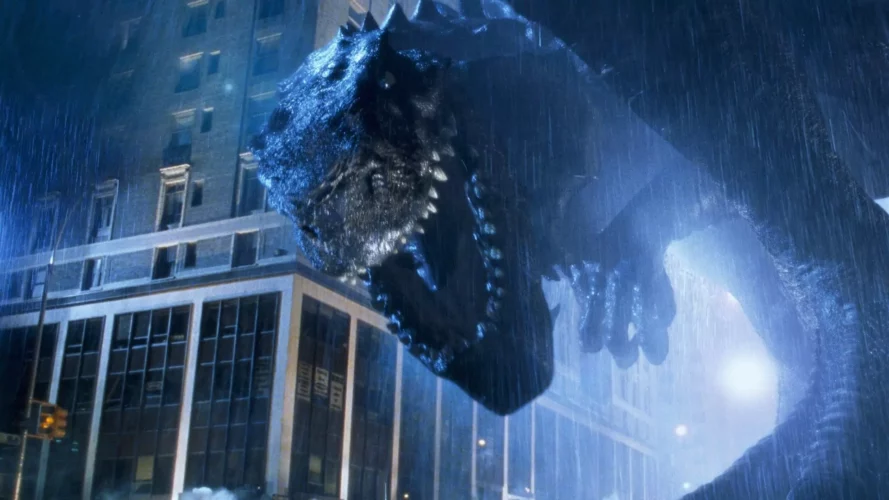
Godzilla: King of the Monsters – 2019
- Director: Michael Dougherty
- Cast: Kyle Chandler, Vera Farmiga, Millie Bobby Brown
Description: As ancient Titans awaken, humanity teeters on the brink. The movie, while showcasing epic battles between Godzilla, Mothra, Rodan, and King Ghidorah, also wrestles with deeper themes: mankind’s responsibility to nature, the need for ecological balance, and the innate human tendency to control forces beyond comprehension.
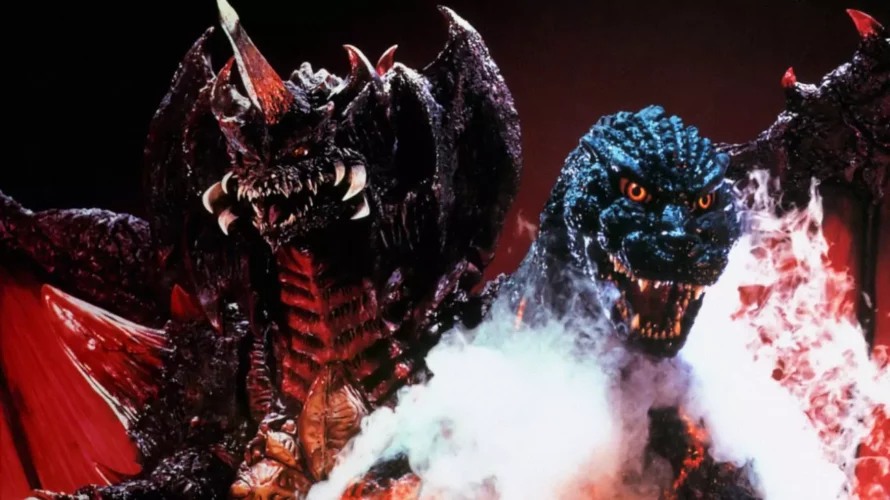
Godzilla: The Planet Eater – 2018
- Directors: Hiroyuki Seshita, Kôbun Shizuno
- Cast: Mamoru Miyano, Takahiro Sakurai, Kana Hanazawa
Description: In this philosophical climax of the trilogy, the emergence of King Ghidorah, an extraterrestrial entity, forces humanity to confront its beliefs. Beyond the monster battles, the story delves deep into themes of faith, existential nihilism, and humanity’s search for meaning in a vast cosmos.
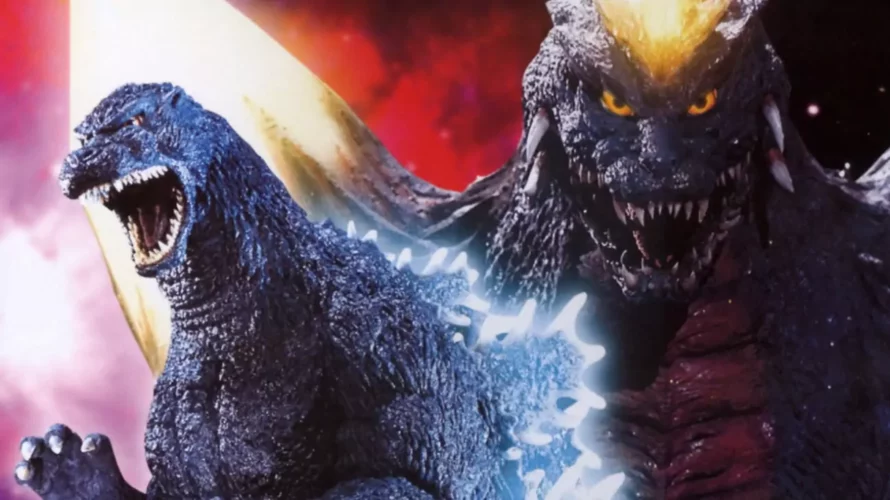
Godzilla: City on the Edge of Battle – 2018
- Directors: Hiroyuki Seshita, Kôbun Shizuno
- Cast: Mamoru Miyano, Takahiro Sakurai, Kana Hanazawa
Description: Continuing the animated saga, survivors uncover Mechagodzilla City. As they harness its might to challenge Godzilla, ethical questions arise: at what point does the line between humanity and machinery vanish? The story ponders the essence of humanity amidst technological marvels.
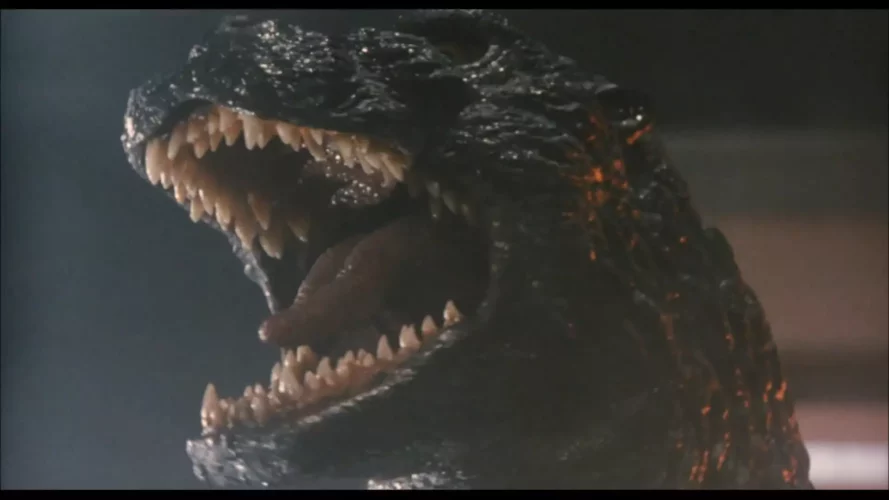
Godzilla: Planet of the Monsters – 2017
- Directors: Hiroyuki Seshita, Kôbun Shizuno
- Cast: Mamoru Miyano, Takahiro Sakurai, Kana Hanazawa
Description: Set in a futuristic era, after kaijus have overrun Earth, this animated film sees humanity returning from exile in space. Armed with a plan to reclaim their homeland, they’re confronted with a much-changed ecosystem dominated by Godzilla. The film contemplates themes of home, displacement, and humanity’s place in the natural order.
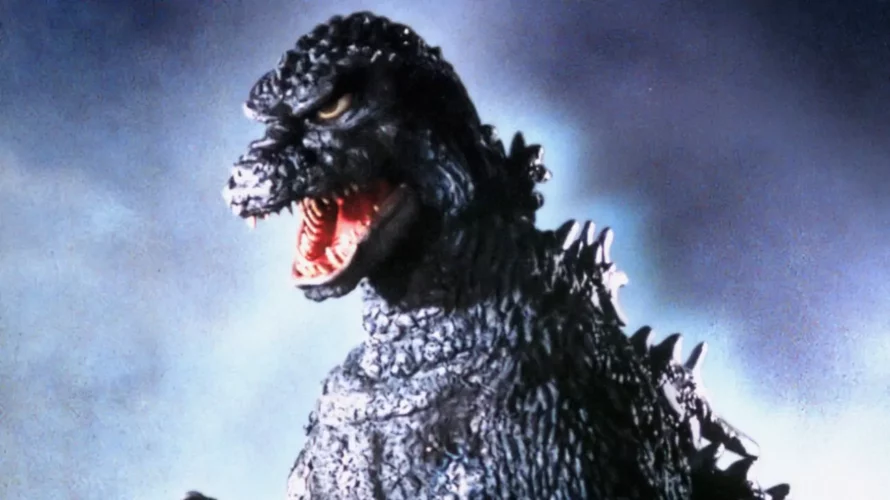
Shin Godzilla – 2016
- Directors: Hideaki Anno, Shinji Higuchi
- Cast: Hiroki Hasegawa, Yutaka Takenouchi, Satomi Ishihara
Description: This reimagining depicts Godzilla as a constantly evolving entity, challenging Japan’s bureaucratic systems. The movie, echoing the trauma of the 2011 Fukushima disaster, portrays the limitations of bureaucratic processes during emergencies. It’s a sharp critique on governance and policy-making, told through the lens of a nation facing an ever-adapting threat.
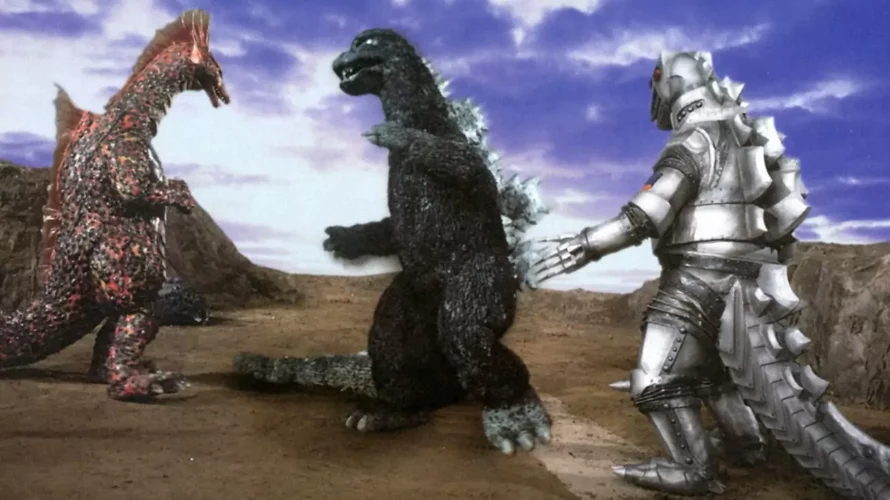
Godzilla – 2014
- Director: Gareth Edwards
- Cast: Aaron Taylor-Johnson, Elizabeth Olsen, Bryan Cranston
Description: A fresh take from Hollywood, the movie repositions Godzilla as a primordial force of nature awakened by mankind’s environmental meddling. As two MUTOs (Massive Unidentified Terrestrial Organisms) threaten humanity, Godzilla emerges from the depths, not as a destroyer, but as nature’s balancer. The film is a dramatic reflection on the hubris of human progress and the power of nature’s equilibrium.
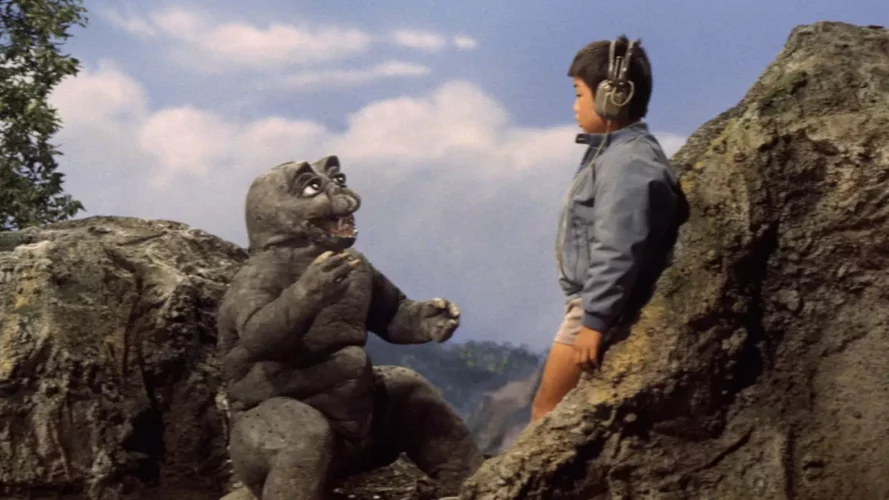
Godzilla: Final Wars – 2004
- Director: Ryuhei Kitamura
- Cast: Masahiro Matsuoka, Rei Kikukawa, Don Frye
Description: Celebrating Godzilla’s 50th anniversary, this film is a high-octane ride pitting Godzilla against a plethora of past foes, orchestrated by the malevolent Xiliens. It’s an adrenaline-charged tribute to the franchise, interspersed with themes of human resilience, unity, and the innate desire for freedom from external control.
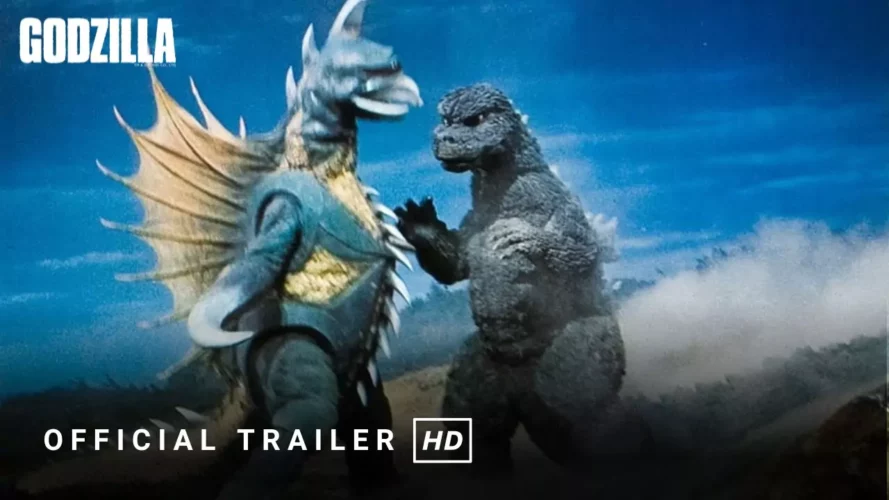
Godzilla: Tokyo S.O.S. – 2003
- Director: Masaaki Tezuka
- Cast: Noboru Kaneko, Miho Yoshioka, Mitsuki Koga
Description: This direct sequel to the previous film sees Mothra’s twin fairies warning humanity against using the bones of the dead for warfare. As Kiryu awaits repairs, Mothra steps into the fray against Godzilla. But when Kiryu returns, it’s not just a battle of monsters but a reflection on the consequences of disturbing the rest of the deceased.
Godzilla Against Mechagodzilla – 2002
- Director: Masaaki Tezuka
- Cast: Yumiko Shaku, Shin Takuma, Kana Onodera
Description: Humanity’s answer to Godzilla’s terror is a mechanical marvel named Kiryu, constructed from the bones of the original 1954 Godzilla. However, when the spirit of the original Godzilla awakens within the machine, the lines between organic and mechanical blur. The movie is a contemplative look at science’s limits and the ethics of using the past to confront the present.
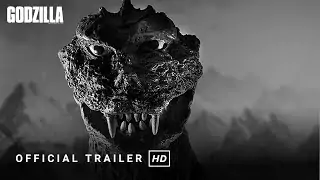
Godzilla, Mothra and King Ghidorah: Giant Monsters All-Out Attack – 2001
- Director: Shusuke Kaneko
- Cast: Chiharu Niiyama, Ryudo Uzaki, Masahiro Kobayashi
Description: Japan is under threat once again, but this time, it’s not just Godzilla. According to ancient legends, three Guardian Monsters – Mothra, King Ghidorah, and Baragon – are destined to rise and protect Japan. The film is a deep dive into Japanese mythology and collective memory, juxtaposing modern urban life with timeless tales of heroism and retribution.
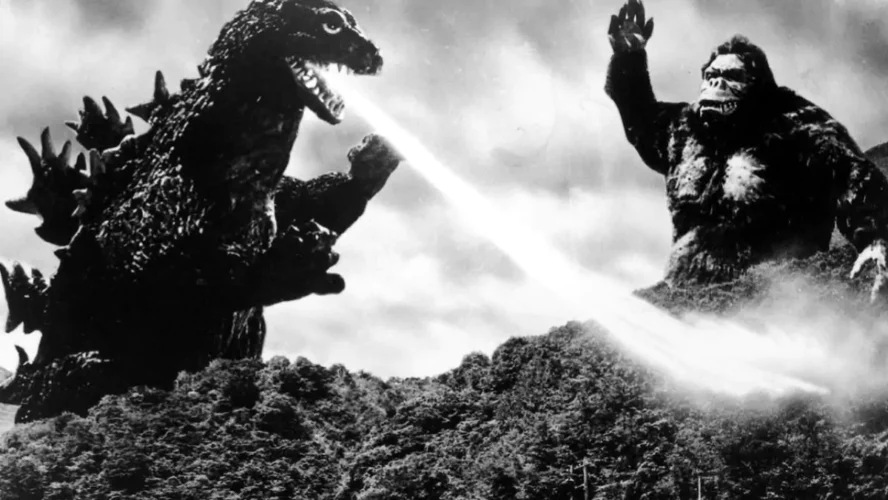
Godzilla vs. Megaguirus – 2000
- Director: Masaaki Tezuka
- Cast: Misato Tanaka, Shôsuke Tanihara, Masatô Ibu
Description: In a Japan armed with anti-Godzilla technology, the unintended creation of a wormhole brings prehistoric dragonflies and their evolved form, Megaguirus, to the present. The film’s core explores humanity’s actions’ unintended consequences and the cyclic repercussions of time.
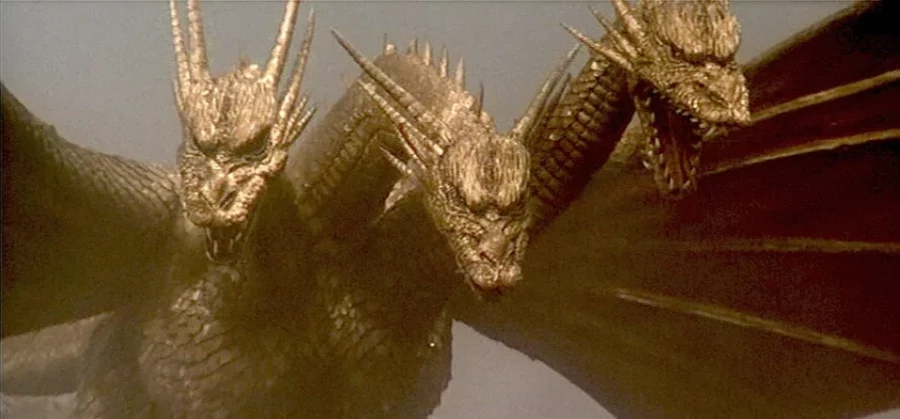
Godzilla 2000: Millennium – 1999
- Director: Takao Okawara
- Cast: Takehiro Murata, Hiroshi Abe, Naomi Nishida
Description: A return to traditional form, this film pits Godzilla against Orga, an ancient alien lifeform. The ensuing battle and human efforts to decipher this extraterrestrial threat serve as metaphors for mankind’s grappling with the unknown and respecting nature’s ancient forces.
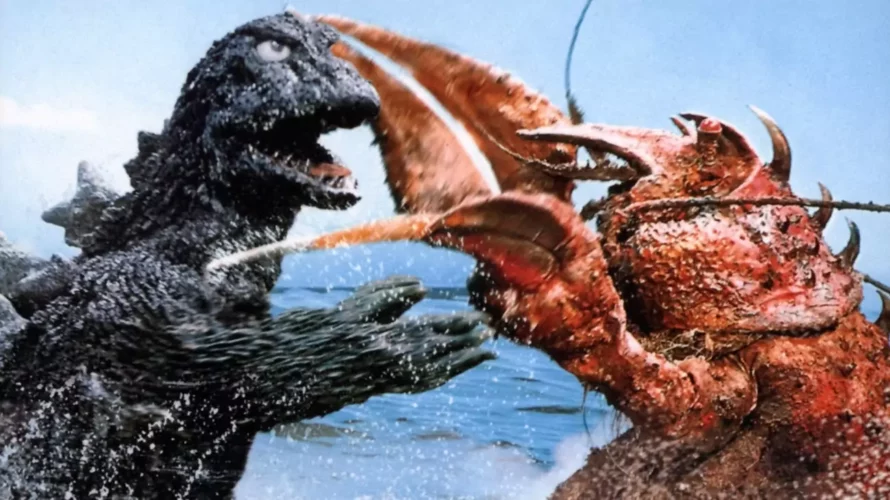
Godzilla – 1998
- Director: Roland Emmerich
- Cast: Matthew Broderick, Jean Reno, Maria Pitillo
- Description: This Hollywood rendition recasts Godzilla as a faster, more agile predator threatening New York City. Though a departure from the traditional Godzilla design and narrative, it’s an ambitious attempt to Westernize the kaiju genre, focusing on a singular creature’s mayhem rather than thematic depths.
Godzilla vs. Destoroyah – 1995
- Director: Takao Okawara
- Cast: Takuro Tatsumi, Yôko Ishino, Yasufumi Hayashi
Description: Harkening back to the 1954 film’s themes, this installment sees Godzilla’s own impending nuclear meltdown paralleled by the rise of Destoroyah, a monstrous embodiment of the weapon that once killed Godzilla. It’s a tale of endings and new beginnings, signaling an era’s closure.
Godzilla vs. SpaceGodzilla – 1994
- Director: Kensho Yamashita
- Cast: Megumi Odaka, Jun Hashizume, Zenkichi Yoneyama
Description: From the void of space, a familiar threat with a cosmic twist emerges: SpaceGodzilla. This celestial doppelganger, born from Godzilla’s cells drifting in space, challenges the King of Monsters in battles that symbolize internal struggles and external confrontations.
Godzilla vs. Mechagodzilla II – 1993
- Director: Takao Okawara
- Cast: Masahiro Takashima, Ryoko Sano, Megumi Odak
Description: The United Nations’ counter-Godzilla strategy culminates in the creation of Mechagodzilla. Amidst the technologically augmented battles, Baby Godzilla’s presence introduces emotional layers, questioning the boundaries between natural and artificial life.
Godzilla vs. Mothra – 1992
- Director: Takao Okawara
- Cast: Tetsuya Bessho, Satomi Kobayashi, Takehiro Murata
Description: Ancient lore meets corporate greed in this return of Mothra. As Mothra and her dark counterpart, Battra, are reawakened, their battles with Godzilla form the backdrop for deeper ecological and philosophical reflections on nature’s balance.
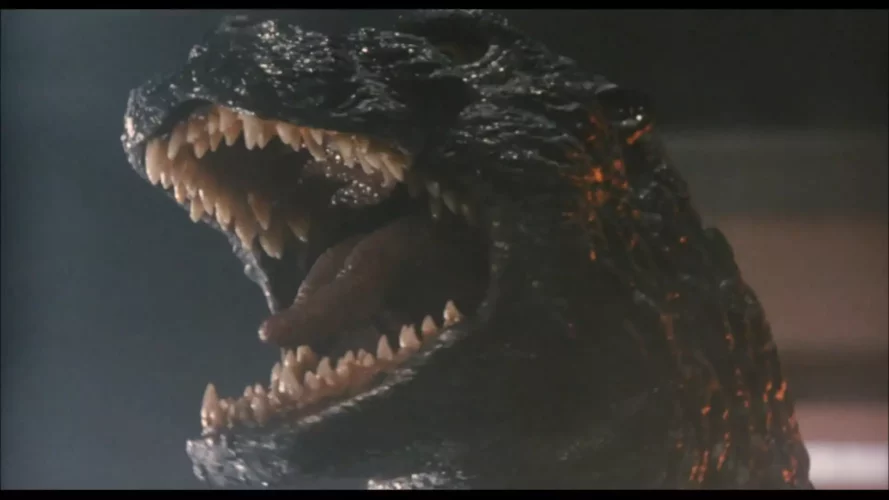
Godzilla vs. King Ghidorah – 1991
- Director: Kazuki Ōmori
- Cast: Kosuke Toyohara, Anna Nakagawa, Megumi Odaka
Description: A time-travel extravaganza, the film introduces futuristic individuals intending to rewrite history. The creation of King Ghidorah as a tool for control and Godzilla’s resistance melds sci-fi elements with kaiju action, emphasizing the cyclical nature of time and the unforeseen repercussions of altering the past.
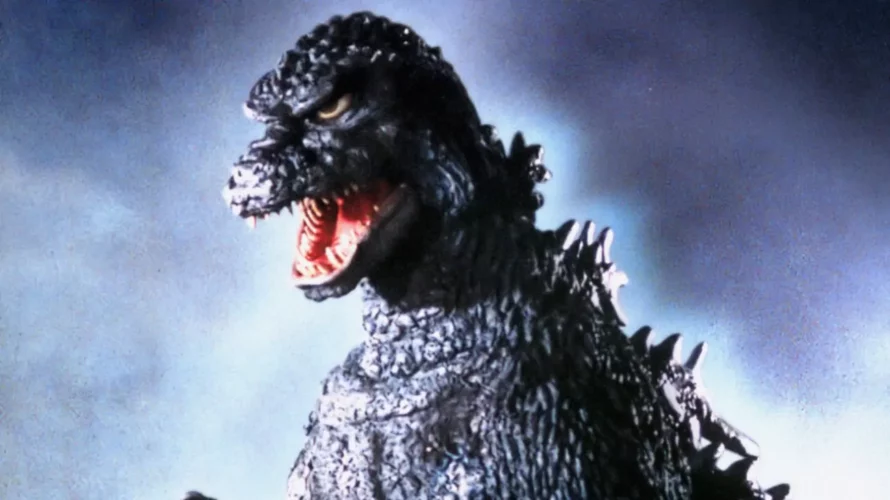
Godzilla vs. Biollante – 1989
- Director: Kazuki Ōmori
- Cast: Kunihiko Mitamura, Yoshiko Tanaka, Masanobu Takashima
Description: An experimental fusion of Godzilla cells, a rose, and human DNA gives rise to Biollante, a poetic monster symbolizing the perils and potential of genetic engineering. The narrative becomes a cautionary tale about meddling with nature’s design.
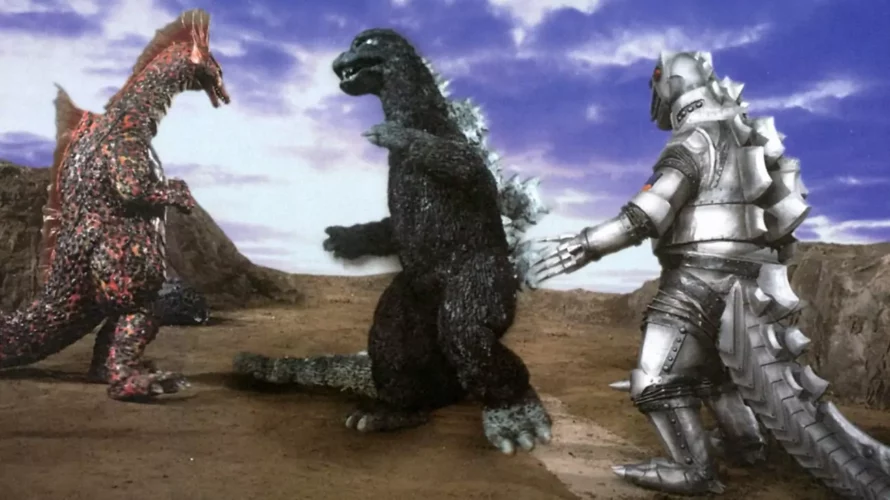
The Return of Godzilla – 1984
- Director: Koji Hashimoto
- Cast: Ken Tanaka, Yasuko Sawaguchi, Yôsuke Natsuki
Description: A modern reboot, this film repositions Godzilla as a symbol of nuclear tensions during the Cold War era. As Godzilla advances, geopolitical stakeholders debate using nuclear solutions, capturing the zeitgeist of nuclear deterrence and geopolitical brinkmanship of the ’80s.
Terror of Mechagodzilla – 1975
- Director: Ishirō Honda
- Cast: Katsuhiko Sasaki, Tomoko Ai, Akihiko Hirata
Description: Continuing the Mechagodzilla arc, the film delves into themes of revenge and redemption. The antagonist, Titanosaurus, and a rebuilt Mechagodzilla are set against Godzilla in a final showdown that signifies the end of the Showa era of Godzilla films.
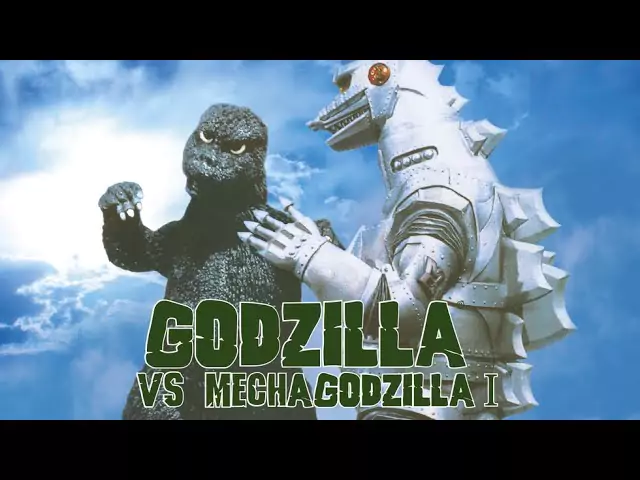
Godzilla vs. Mechagodzilla – 1974
- Director: Jun Fukuda
- Cast: Masaaki Daimon, Kazuya Aoyama, Reiko Tajima
Description: Introducing the mechanized doppelganger of Godzilla, Mechagodzilla, this film is a mesh of technology, mysticism, and kaiju battles. When Godzilla’s robotic counterpart wreaks havoc under alien control, ancient prophecies predict the outcome of this clash of titans.
Godzilla vs. Megalon – 1973
- Director: Jun Fukuda
- Cast: Katsuhiko Sasaki, Hiroyuki Kawase, Yutaka Hayashi
Description: A subterranean civilization retaliates against surface-dwelling humans by unleashing Megalon, a beetle-god. The movie amalgamates technology and kaiju action, with the robot Jet Jaguar teaming up with Godzilla in a wrestling-inspired battle against Megalon and Gigan.
Godzilla vs. Gigan – 1972
- Director: Jun Fukuda
- Cast: Hiroshi Ishikawa, Yuriko Hishimi, Minoru Takashima
Description: Incorporating classic alien invasion tropes, this narrative is set in a Godzilla-themed amusement park. It takes a satirical lens to critique corporate monopolies while delivering on kaiju battles as Godzilla allies with Anguirus against Gigan and King Ghidorah.
Godzilla vs. Hedorah – 1971
- Director: Yoshimitsu Banno
- Cast: Akira Yamauchi, Toshie Kimura, Hiroyuki Kawase
Description: A powerful environmental critique, this film introduces Hedorah, a monstrous embodiment of pollution. As the smog monster consumes pollutants, its destruction mirrors humanity’s environmental atrocities. The film’s tone oscillates between psychedelic and grim, underscoring the environmental message.
All Monsters Attack – 1969
- Director: Ishirō Honda
- Cast: Kenji Sahara, Machiko Naka, Tomonori Yazaki
Description: A unique offering, this film is a dreamscape exploration of a young boy’s challenges. Navigating between fantasy and reality, the boy learns life lessons from his interactions with Minilla, emphasizing personal courage and resilience.
Destroy All Monsters – 1968
- Director: Ishirō Honda
- Cast: Akira Kubo, Jun Tazaki, Yukiko Kobayashi
Description: A futuristic vision sets monsters in an enclave called Monsterland, but peace is short-lived when aliens manipulate these kaiju for terrestrial domination. It’s a grand reunion of monsters, representing a pinnacle of the Showa-era Godzilla films.
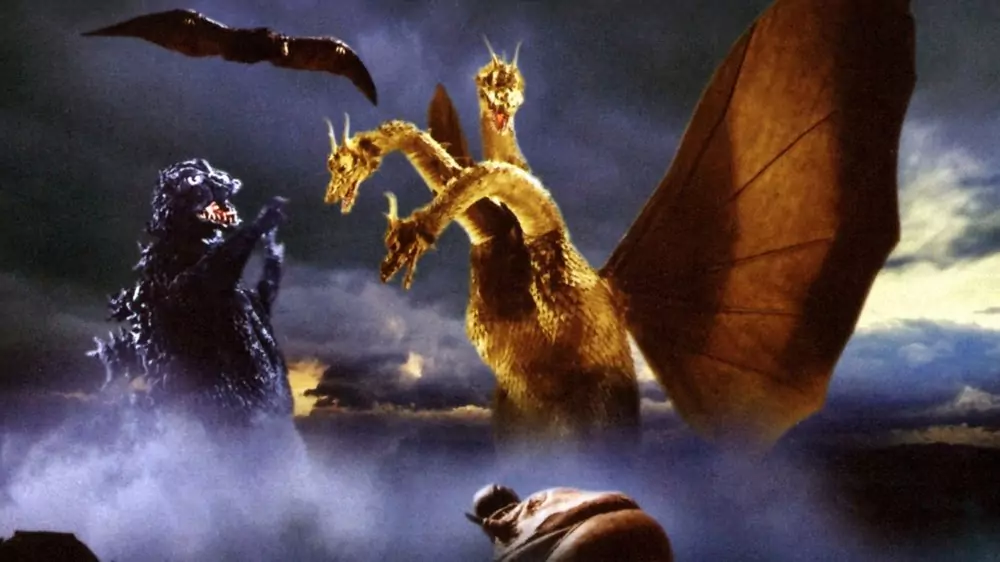
Son of Godzilla – 1967
- Director: Jun Fukuda
- Cast: Tadao Takashima, Akira Kubo, Beverly Maeda
Description: On a remote island, science meets nature as a weather experiment goes awry. The introduction of Minilla, Godzilla’s son, showcases Godzilla as a mentor, forging a touching narrative about parenthood and legacy.
Ebirah, Horror of the Deep – 1966
- Director: Jun Fukuda
- Cast: Akira Takarada, Kumi Mizuno, Chôtarô Tôgin
Description: This tropical thriller reimagines Godzilla as an unexpected hero against the Red Bamboo organization. With secret bases, nefarious plots, and the monstrous Ebirah, the film is an adventurous departure from city-centric destruction.
Invasion of Astro-Monster – 1965
- Director: Ishirō Honda
- Cast: Nick Adams, Akira Takarada, Jun Tazaki
Description: Venturing into the sci-fi realm, this narrative pivots on interplanetary diplomacy, treachery, and battle. When Earth’s monsters are beckoned to save Planet X from Ghidorah, a deeper conspiracy is unveiled, leading to cosmic confrontations.
Ghidorah, the Three-Headed Monster – 1964
- Director: Ishirō Honda
- Cast: Yosuke Natsuki, Hiroshi Koizumi, Yuriko Hoshi
Description: Introducing the cosmic terror, King Ghidorah, this film amplifies the stakes. Earth’s monsters, once foes, unite against this common extraterrestrial threat. It speaks of unity, suggesting that Earth’s inhabitants, human or kaiju, are bound by a shared fate.
Mothra vs. Godzilla – 1964
- Director: Ishirō Honda
- Cast: Akira Takarada, Yuriko Hoshi, Hiroshi Koizumi
Description: The discovery of a colossal egg heralds Mothra’s entrance. As Godzilla and Mothra clash, underlying threads of corporate greed and environmentalism are teased out. The narrative cleverly critiques humanity’s insatiable appetite for profit at nature’s expense.
King Kong vs. Godzilla – 1962
- Director: Ishirō Honda
- Cast: Tadao Takashima, Kenji Sahara, Yū Fujiki
Description: This ambitious crossover is more than an East meets West showdown. It juxtaposes two cinematic titans, each representing distinct cultural fears and wonders. The unfolding drama, amidst moments of light-heartedness, critiques the commodification of legends for corporate gains.
Godzilla Raids Again – 1955
- Director: Motoyoshi Oda
- Cast: Hiroshi Koizumi, Setsuko Wakayama, Minoru Chiaki
Description: This sequel sees the return of Godzilla, now accompanied by a new creature, Anguirus. Their battles, set amidst urban landscapes, symbolize a nation’s journey from destruction to rebirth, representing Japan’s resilience and hope amidst despair.
Godzilla – 1954
- Director: Ishirō Honda
- Cast: Akira Takarada, Momoko Kôchi, Akihiko Hirata
Description: Positioned against post-war Japan’s backdrop, Godzilla transcends mere horror. It captures the echoes of nuclear devastation, a reminder of the Hiroshima and Nagasaki horrors. Godzilla’s emergence is triggered by nuclear tests, and its path of destruction is eerily reminiscent of the recent nuclear tragedies, making it an enduring classic.
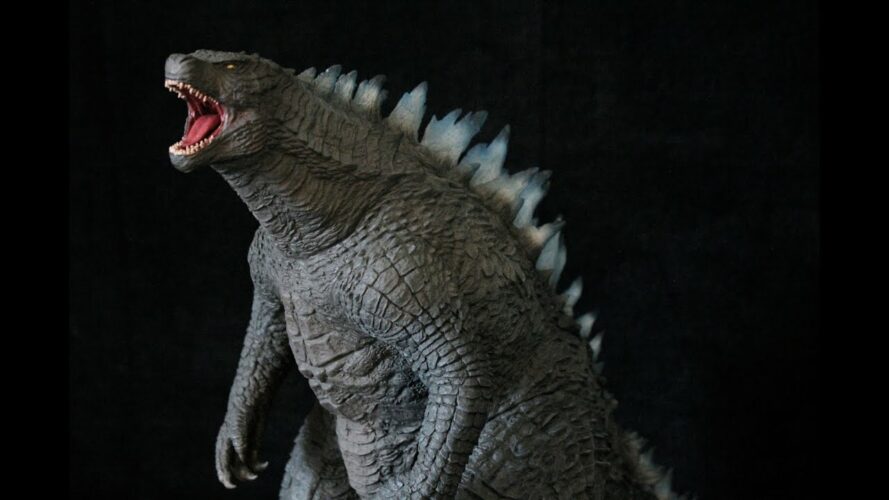
In Retrospect
From the radioactive ashes of Hiroshima and Nagasaki emerged a creature that, over decades, evolved from a symbol of nuclear terror to a representation of diverse global challenges. The Godzilla films, with their towering battles and intricate subtexts, offer viewers more than just popcorn entertainment.
They invite introspection, challenge prevailing norms, and, most importantly, serve as cinematic touchstones reflecting the zeitgeist of their respective eras. As our world changes, so too does Godzilla, ever-adapting, ever-relevant, reminding us of our past mistakes, present challenges, and the hope (or warning) for the future. Whatever the future holds for the King of Monsters, one thing is clear: Godzilla will continue to reign, both on screen and in our collective consciousness.
Wrapping it up
The Godzilla movies in order, in its vast and diverse cinematic tapestry, is more than just a series of monster battles. It’s a poignant reflection of societal fears, hopes, and challenges across eras.
From the haunting shadows of post-war Japan to the complexities of modern-day bureaucracy and environmental concerns, Godzilla has been a mirror to humanity’s inner struggles and outer adversities. Each film, with its unique narrative and thematic undertones, offers a window into the issues of its time, making Godzilla not just a pop-culture icon but also a socio-cultural barometer.
As we await future installments, the legacy of Godzilla serves as a testament to the power of storytelling and its ability to reflect, critique, and imagine our place in the vast tapestry of existence. The roar of the King of the Monsters is not just a sound of terror or triumph but a call to remember our past, confront our present, and hope for a better, more harmonious future.
